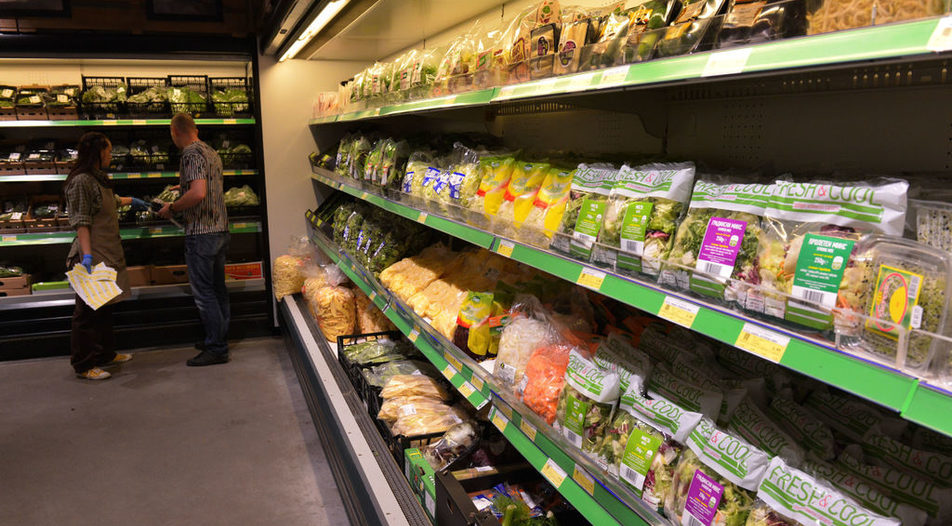Bulgaria's economic growth slowed down a bit at the end of last year. Gross domestic product rose by an annualized 3.6% in the final quarter of 2017, according to flash data from the National Statistical Institute (NSI). In comparison, strong tourism revenue and the construction sector lifted the economy by 3.9% in the third quarter of 2017. Consumption continues to be the key driver of the robust growth. Similarly, investment is also on the rise, but the declining rate of growth shows that recovery remains sluggish. On the other hand, imports continue to outpace exports. As a result, foreign trade's contribution to economic growth moves into negative territory, in line with forecasts of analysts and international institutions. The likelihood of full-year growth of 4% in 2017 predicted by some analysts seems increasingly remote.
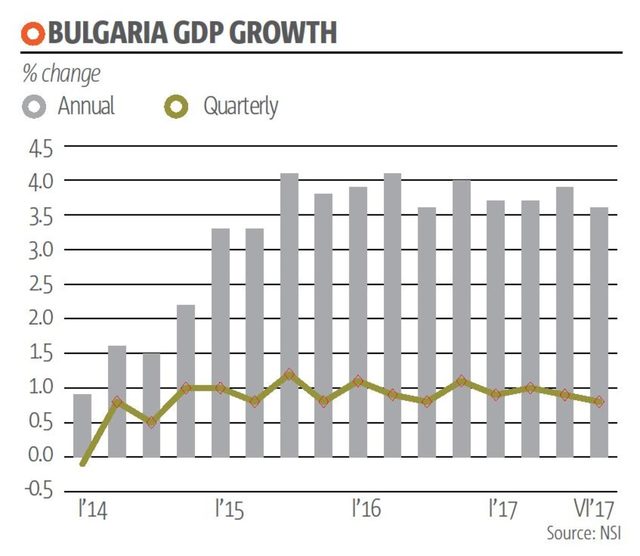
Despite lackluster data, the Bulgarian economy is growing above the EU average of 2.6%. Having said that, the pace in the final quarter is the slowest among all Central and Eastern European countries.
Consumption can do more
Domestic spending remained the key driver of growth in the last months of 2017. One of the main components of GDP, final consumption rose by an annualized rate of 4.7%, increasing from 4.3% of the previous quarter.
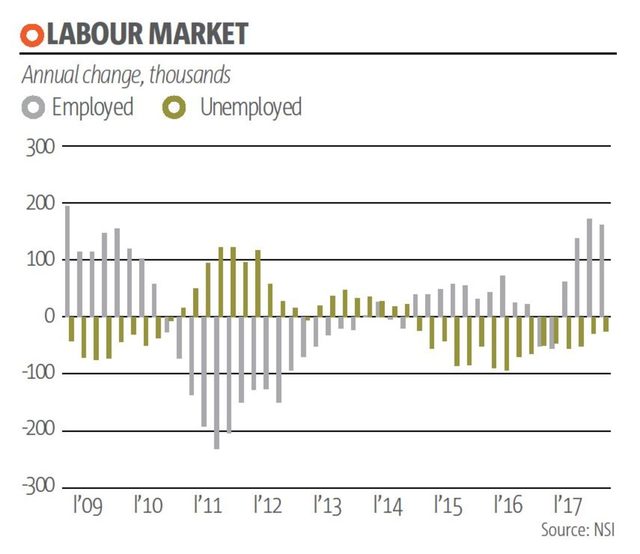
Considering the positive trends in the labor market, growth is probably coming from spending by Bulgarian households, as was the case in the previous periods. The number of working people rose by 160 thousand in the fourth quarter compared to the like period of 2016. At the same time, the unemployed and discouraged decreased significantly as well - by 25.6 and a whopping 61.8 thousand people, respectively. In effect, the unemployment rate fell by 1.1 percentage points in a year, reaching 5.7%, while the tightening labor market paved the way for a further 11% rise in wages.
As expected, all of these factors drove up the country's purchasing power. At the same time though, the rate of increase of remuneration significantly outpaced spending.
"One explanation is that a part of business and households is still very cautious and are saving," said Krasen Yotov of Industry Watch, a Sofia-based economic think-tank. He added that proof of the propensity to postpone consumption and investment is the record surge in non-financial firms' bank deposits in 2017.
More imports, less exports
The rise in purchasing power is reflected not only in domestic consumption but in foreign trade as well. While export growth slowed to the mediocre rate of 2% at the end of the year, the upsurge in imports reached an annualized 9.4%. As a result, despite strong sales of Bulgarian products abroad, the foreign trade's contribution to the economic expansion turned negative.
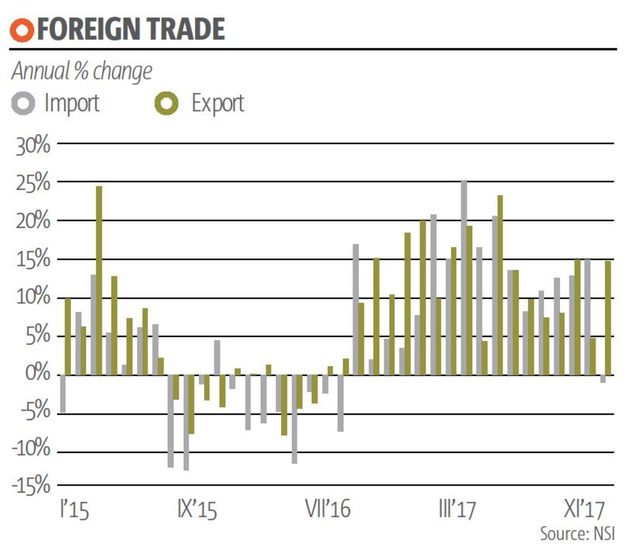
One possible reason for this turn of events could be connected to consumer preferences, which are probably more inclined towards import goods. On the other hand, supply is also a factor. Limited production capacity resulting from obsolete equipment and machines would not allow Bulgarian companies to respond adequately to current demand, said Yotov. In effect, a part of the benefits from surging wages and solid employment is going abroad.
Investment is (languidly) rising
On a positive note, the data also showed that investment continued to grow, climbing at a pace of 3.2% in the fourth quarter. Though lower than the registered rate in the previous period, the uptick is good news for long-term economic growth.
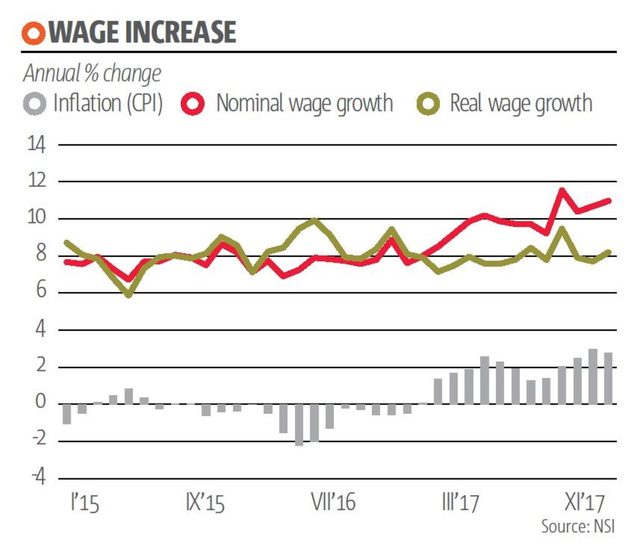
"We cannot expect a significant change considering the lack of improvement in the business environment, judging by reports like Doing Business," said Yotov. He added that little is being done with regard to attracting foreign investors as well.
"Many other countries from Central and Eastern Europe are spending large sums in order to attract investors. Whereas Bulgaria is, in practice, on autopilot. There are no active policies, which is why the country is falling behind the rest of the region in the last several years," said Yotov.
"One of the challenges for our economy is to make it so that less people produce more, in view of worsening demographics," said Georgi Angelov of Open Society Institute - Sofia. According to him, companies still do not realise that they need to invest in more machines in order to increase productivity of labor.
A look ahead
Analysts forecast that growth will continue with little change in pace this year and next. There are challenges ahead though. Euro appreciation, for example, is pressuring export companies.
"For firms that export goods to markets outside the eurozone it will be difficult to be competitive in relation to price," said Yotov.
Another shadow is cast by interest rates, where a potential hike would affect both consumption and investment. However, according to Angelov, it is doubtful that the European Central Bank would lift rates in 2018.
Bulgaria's economic growth slowed down a bit at the end of last year. Gross domestic product rose by an annualized 3.6% in the final quarter of 2017, according to flash data from the National Statistical Institute (NSI). In comparison, strong tourism revenue and the construction sector lifted the economy by 3.9% in the third quarter of 2017. Consumption continues to be the key driver of the robust growth. Similarly, investment is also on the rise, but the declining rate of growth shows that recovery remains sluggish. On the other hand, imports continue to outpace exports. As a result, foreign trade's contribution to economic growth moves into negative territory, in line with forecasts of analysts and international institutions. The likelihood of full-year growth of 4% in 2017 predicted by some analysts seems increasingly remote.









